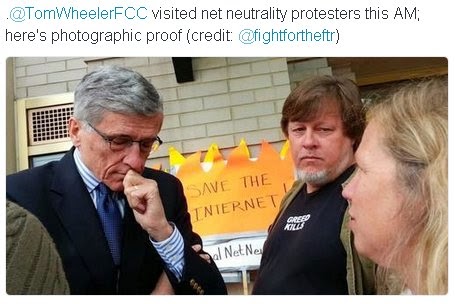Is today the beginning of the end of
Net Neutrality? 10:30 Important Vote.
 Today, May 15, 2014 a vote will be taken at the
FCC. Today the Internet we know can change forever. Today at 10:30 am EST the
FCC meets to vote on the issue on whether or not allow the collection of
special rates to provide certain services through the Internet for those who
can afford it. A "faster lane"
has been called. Events can be followed live here:
http://www.fcc.gov/events/open-commission-meeting-may-2014
Today, May 15, 2014 a vote will be taken at the
FCC. Today the Internet we know can change forever. Today at 10:30 am EST the
FCC meets to vote on the issue on whether or not allow the collection of
special rates to provide certain services through the Internet for those who
can afford it. A "faster lane"
has been called. Events can be followed live here:
http://www.fcc.gov/events/open-commission-meeting-may-2014
Who will pay for the use of this improved
infrastructure? According to the carrier companies it will will be pay by the service
providers (eg NetFlix company that provides video service over the Internet). They do not think that the user is going to
pay for the "premium" service. But obviously all higher costs for the service
the carrier provides will be assumed by the NetFlix (or any company that hires
the “premium service”) or will be transferred to the end user.
This complex transaction finally has a single
objective: the carrier signal company, the "Telco" as it was formerly
known, will get a bigger profit.
 The "carriers" are already making
millions due to monopoly or duopoly situation in which they are found in 80% of
U.S. territory. Given that scenario there are only two ways to get the “high speed
lanes”:
The "carriers" are already making
millions due to monopoly or duopoly situation in which they are found in 80% of
U.S. territory. Given that scenario there are only two ways to get the “high speed
lanes”: - The carriers will create a new physical infrastructure to deliver these "fast", "optimized" or "Premium" services. That is a new layer, a new level, will be created in addition to the already known "TIER 1", "TIER 2" and "TIER 3”. Where this layer will be inserted? Obviously, due to its characteristic of being a much faster service must be inserted just below the infrastructure of the "Tier 1" or be part of this.
- They will put "filters" to prevent users -who do not engage the "Internet Premium" service- can exceed certain download speed or exceed the amount of information that can be downloaded from the internet in some specific time slot. All will come to them in a slower way if we do comparison with what users get today. This is just to make "space" for users with "Internet Premium" contracts. These privileged users will get increased download speed.
The problem will affect the whole world because companies like NetFlix,
to continue with the previous example, have international operations. The whole world will afford this DIGITAL
ABYSS between those who can pay for a premium service and those who does not. International servers, since they are in the U.S., will go through
the filter of the companies belonging to the "Tier 1" and therefore,
although if you are located in a country with no specific filters, all that
comes from the U.S. will be "accelerated" or will be passive of this artificial
"slowness", oblivious to TCP / IP, which is placed with the sole aim
of obtaining more profit.
The strange thing is that they are using
resources that are intended for general public service: IP numbers, DNS servers
and the domains themselves. The
situation would have been different if a big company, such as NetFlix, decides to bring their video service at a rapid pace through the Intranet of a carrier…
but here the intention is to use public IP numbers to create a PRIVATE SERVICE
which only will be accessed by those who can afford it.
Does the today’s Digital Divide will become tomorrow’s
DIGITAL ABYSS? In a few hours we will see. Due to the hour here in Lima Peru – 5:30
in the morning- we will repeat that old saying: good night and good luck
Internet!
Javier Rodriguez. Lima, Peru. May 15, 2014
